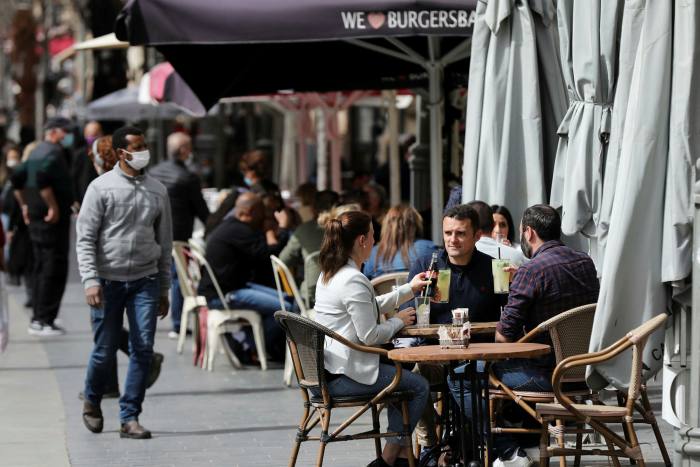[ad_1]
At the Beer Bazaar in a historic Tel Aviv flea market, the waitress poured whisky chasers for the already drunk revellers, raised her shot to the sky and cheered Israel’s saviour.
“To Pfizer!†she exclaimed, and rushed off to find a table for the crowds pouring through the streets of a neighbourhood in the south of the city on a weekday night. “L’chaim.â€
It’s an apt toast — L’Chaim is Hebrew for “To life,†and a week into Israel’s official reopening, the country is still partying. With 4m of its almost 7m adult population fully vaccinated with the BioNTech/Pfizer jab and another 1m awaiting their second dose, Israelis are immersed in a carnival of post-pandemic rebirth that has left its citizens giddy with their new freedoms — restaurants are fully booked, bars are packed, traffic has returned to its infamous snail pace and life, dreary and frightening for a year, is back to normal.
From abroad, these look like scenes from a different planet, or from a long-anticipated future — friends hugging and new lovers kissing, silverware and tablecloths inside lavish restaurants, children playing with grandparents and strangers sharing joints on the street.
The speed with which Israelis have bounced back holds a tantalising promise for the rest of the world. “Life waits for you,†said Susannah Cohen, 72, giggling like a schoolgirl with her friends at a restaurant in Tel Aviv’s French district.

Scattered on the table: two empty bottles of rosé, an almost empty packet of Vogue slim cigarettes and the remains of a three-hour lunch — the friends having dived in and out of each others’ appetisers.
The only masks in sight are those worn by the waiters, eager to return to work, and hungry for tips from ecstatic customers. “It’s good to be busy,†said one. “It feels normal.â€
The scars of past lockdowns are still visible — shuttered store fronts, the emergence of beggars at traffic lights and the frantic search for jobs as the government’s Covid-19 unemployment insurance starts winding down. Almost 6,000 Israelis died of Covid-19, and at the pandemic’s peak, one in three Israelis was out of work. With hospitals in the occupied West Bank running out of space, the Palestinian territories remain in the grip of the pandemic.
Israelis spent more days — a total of 139 — under lockdown than any other nation in the world, according to the Oxford Coronavirus Government Response Tracker. In the autumn of 2020, according to data from Johns Hopkins University, the Jewish state had the highest rate of new infections per capita of any country in the world.
The lockdowns hit businesses hard. Even though gross domestic product shrunk only 2.4 per cent in 2020, thanks to an unexpected leap in diamond exports, private consumption fell 10 per cent. And while high-tech companies quickly transitioned to working remotely, small businesses did not.
And the government’s failures during the crisis — including clashes with the ultraorthodox Haredi community over lockdowns and an inability to stop the arrival of new variants or to agree on stimulus and aid for the economy — will overshadow elections on March 23.
Many remain anxious — a poll by Channel 12 news on Wednesday showed that three-quarters of Israelis were still wary of declaring the pandemic over, despite the raucous partying and celebrating on the streets outside.
“It’s like you were an innocent man in jail and, suddenly, someone has thrown you the key,†said Ibrahim Azizi, 48 and diabetic, stroking his son’s hair outside a just-opened school in Jaffa. “You are anxious — what if it is a joke? What if they put you back in jail?â€
But the jubilation over the end of lockdown is infectious, especially among the young. Even before it officially ended, the Jewish festival of Purim, where tradition mandates exuberant public drunkenness, saw hundreds of thousands of costumed youth flood the streets.
In Tel Aviv’s party districts, the police have quickly switched from enforcing coronavirus restrictions to crowd control — redirecting joyfully honking cars away from the busiest streets, and keeping an eye out for drunk drivers.
In theory, there are still some restrictions in place — no more than 20 people indoors, for instance, and up to 100 in restaurants that implement a so-called “green passport†scheme. But, in the first chaotic days of the reopening, there was little visible evidence of any attempt to either check the green passports — which can be easily faked — or limit numbers.
While the absence of strictly enforced restrictions leaves open the possibility of a resurgence of the virus, the number of people testing positive has dropped steadily for weeks to under 3 per cent. With warehouses of unused jabs, the world’s fastest vaccination drive has run out of adults to vaccinate. At this stage, those who have not received the jab have no intention of getting vaccinated, either out of concerns about its safety, or because they are convinced that their youth and robust health will protect them.
“I am young. I am strong. My grandparents are vaccinated, my parents are vaccinated,†said Yossi, 28, as he practised acrobatics on the beach in Tel Aviv. “I believe in corona, but I don’t want the vaccine.â€
But what Yossi desperately wants is to get on a flight, and the government is using the threat of forced quarantine on arrival for the unvaccinated to encourage them to get a jab. The government is also considering pushing workplaces to mandate compliance. “Maybe if I need it for my job,†said Yossi, who works as a personal trainer. “Maybe.â€
[ad_2]
Source link






